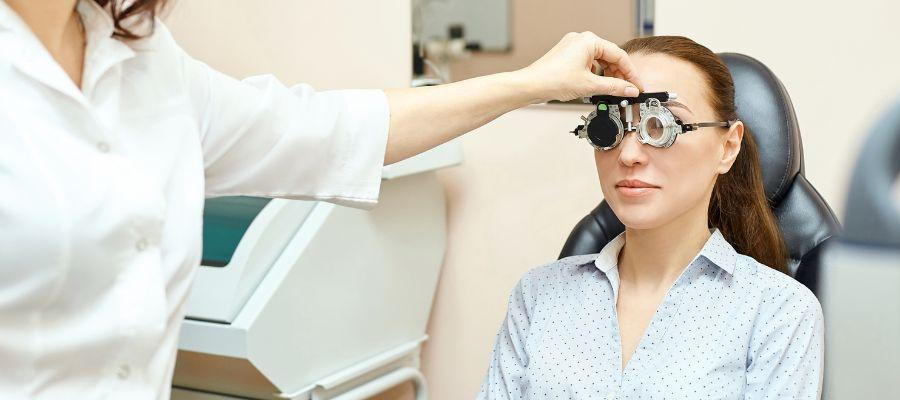
When Should I See An Eye Doctor?
Dappled sunlight may fill you with joy, but clueless about when you should see an eye doctor? At Fifty Dollar Eye Guy, with two convenient Pensacola locations, expect professional, friendly service that meets your eye care needs. Dr. Joseph Tegenkamp and his team are committed to delivering exceptional customer service and personalized care, focusing on comprehensive eye exams and a vast selection of fashionable eyewear. Spend valuable time with him and his dedicated team who ensure a comfortable experience for all patients as they navigate the path to optimal vision. Book an appointment today and take a crucial step towards maintaining your ocular health.
Understanding the Importance of Regular Eye Exams
It's easy to overlook the significance of routine eye exams, especially when you're not experiencing any evident issues with your vision. However, just because your vision seems fine, doesn't mean all is well. Regular eye exams play a crucial role in maintaining overall eye health, and can detect underlying problems that you may not be aware of.
The Role of Regular Eye Exams in Eye Health
Routine eye exams are much more than just updating your glasses or contact lens prescription. They're a vital part of preventative healthcare, helping to identify early signs of eye diseases such as glaucoma and cataract before they develop further and cause significant damage. Timely detection and treatment of such conditions can often prevent vision loss.
Potential Consequences of Neglecting Eye Exams
Not getting regular eye checks can have significant impacts on your eye health. Many common eye diseases, including glaucoma and age-related macular degeneration, may not show any symptoms until substantial and irreversible damage has been done. Failing to diagnose and treat these conditions promptly can result in partial or complete loss of vision.
Recognizing the Signs of Vision Changes
Changes in vision can happen gradually and subtly. As such, many people often don't realize their vision is changing until they start experiencing difficulties in their daily activities.
Common Symptoms of Vision Changes
Signs of vision changes may include difficulty reading fine print, issues in focusing on close or distant objects, frequent squinting, or continually adjusting the distance of your reading materials. You may also experience headaches, eye strain, or discomfort after prolonged periods of reading or using digital devices.
Understanding the General Causes of Vision Changes
Common causes of vision changes include aging, eye strain, inadequate or excessive lighting, uncorrected refractive errors such as nearsightedness or farsightedness, and the onset of certain eye diseases.
Dealing with Eye Discomfort or Pain
Eye discomfort or pain should never be ignored. It's a clear indication that something's not right.
Common Causes of Eye Discomfort or Pain
Eyestrain, dryness, injury, infections, foreign bodies, and conditions such as conjunctivitis and styes are common causes of eye discomfort or pain.
Understanding When to Seek Medical Assistance
If discomfort or pain persists, or you experience sudden vision changes, redness, sensitivity to light, or discharge from the eye, it's essential to seek prompt medical assistance.
Presence of Floating Specks and Flashing Lights
Floating specks and flashing lights might seem minor, but they can indicate underlying issues with your eye health.
What are Floating Specks and Flashing Lights?
Floating specks or 'floaters' are tiny spots or lines that appear in your field of vision. Flashing lights, or 'flashes', are flickers of light that usually happen on the edge of your visual field.
What Could These Symptoms Indicate?
While floaters and flashes are generally harmless and often a normal part of aging, a sudden increase in these might indicate a retina tear or detachment, a serious eye condition that requires immediate treatment.
Experiencing Difficulty Reading
Having trouble reading is often a tell-tale sign of vision changes.
Understanding the Common Causes
Common causes include presbyopia (an age-related condition that makes it difficult to focus on close objects), uncorrected refractive errors, and eye diseases such as macular degeneration.
The Role of Update in Prescription Glasses and Contact Lenses
Updated prescription glasses or contact lenses can help correct refractive errors and improve your reading capabilities.
Presence of Chronic Health Conditions
Certain chronic health conditions can significantly impact your eye health.
Links Between Eye Health and Systemic Diseases
Conditions like diabetes and hypertension can damage the blood vessels in your retinas, leading to conditions called diabetic retinopathy and hypertensive retinopathy.
Importance of Regular Check-ups for Diabetic and Hypertensive Patients
If you have diabetes or high blood pressure, it's vital you get regular eye check-ups. Early detection and keeping your blood sugar and blood pressure under control can prevent vision loss.
Prolonged Computer Use and Eye Strain
In the digital age, extended periods spent in front of screens are inevitable, resulting in a common condition known as computer vision syndrome.
Understanding Computer Vision Syndrome
Also known as digital eye strain, computer vision syndrome includes symptoms such as dry eyes, headaches, blurred vision, and neck and shoulder pain. It is primarily caused by prolonged computer use.
The Need for Regular Eye Check-ups for IT Professionals and Students
If you spend long hours in front of a computer, student or an IT professional, make sure to take regular breaks and have your eyes checked frequently.
Having a Family History of Eye Diseases
Family history can significantly influence your odds of developing certain eye conditions.
Genetic Factors and Eye Health
Certain eye diseases, including glaucoma, age-related macular degeneration, and retinal degenerative diseases, have genetic links.
Importance of Preventative Eye Care
Knowing your family's eye health history can help predict your risk and ensure early detection and treatment.
Noticing Sudden Eye Redness or Dryness
Sudden eye redness or dryness could be indicative of various conditions, ranging from minor issues like allergies to serious conditions like glaucoma.
Understanding the Causes of Redness and Dryness
Common causes of redness and dryness include allergies, irritants, dry eye syndrome, and certain systemic diseases like rheumatoid arthritis or lupus.
When to Seek Medical Assistance for These Symptoms
If you experience persistent eye redness or dryness, or if these symptoms are associated with pain, itching, or a change in vision, it's best to seek a professional medical opinion.
Choosing the Right Eye Doctor
Finding the right eye care professional is essential in keeping your eyes healthy. At 50 Dollar Eye Guy, Dr. Joseph Tegenkamp is well known for his friendly and professional demeanor.
Considering Dr. Joseph Tegenkamp for Eye Care
Dr. Tegenkamp is passionate about providing high-quality eye care, offering comprehensive eye exams, a large selection of fashionable eyewear, and noteworthy vision care.
Contacting the Two Locations of 50 Dollar Eye Guy
You can conveniently visit 50 Dollar Eye Guy at any of its two locations in Pensacola, FL. Committed to providing exceptional customer service, the team at 50 Dollar Eye Guy ensures a personalized and comfortable experience for all patients. If you've been neglecting your eye health, it's the perfect time to make an appointment and take care of your eyes.





